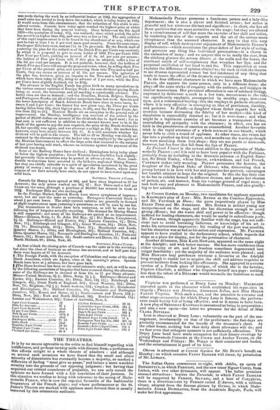THE THEATRES.
kr is by no means agreeable to the critic to find himself regarding with indifference, and perhaps turning aside with distaste from, a performance that affords delight to a whole theatre of admirers : and although on several such occasions we have found that the small and silent minority of dissentients has eventually become a majority, so marked a difference of feeling "must give us pause," and induce a more watchful scrutiny into the grounds of our opposing judgment : but having thus acquitted our critical conscience of prejudice, we can only record the Opinions we have formed with a fair conviction of their justness. In this situation we confess to being with reference to the acting of Made- moiselle PLESSY, who is now the especial favourite of the fashionable frequenters of the French plays; and whose performances at the St. James's Theatre are marked with applause more fervent than is usually bestowed by this aristocratic audience. Mademoiselle PLESSY possesses a handsome person and a lady-like deportment ; she is also a clever and finished artiste ; her action is graceful and her utterance distinct and significant ; in short, she has all those qualities that are most attractive on the stage: but they are alloyed by a consciousness of self that mars the exercise of her skill and talent, by rendering the airs of the coquette and the art of the actress more conspicuous than the assumed character. It may be that this very display of self, which destroys our enjoyment of Mademoiselle PLESSY'S performances—which constitutes the great defect of her style of acting, and prevents any thing like individual personation—is a charm in the estimation of many : and we suspect this to be really the case, from the sidelong glances the actress directs at the stalls and the boxes, the continual smirk of self-complacency that wreathes her lips, and the perpetual oscillation of her bead to and fro. This supposition at once explains the difference of opinion alluded to ; for such as visit the theatre to see dramas represented cannot but feel intolerant of any thing that tends to lessen the effect of the dramatic representation.
In the four different characters in which we have seen Mademoiselle PLESSY, she appears the same person, only in a different dress; she plays off the same tricks of coquetry with the audience, and-intkulges in p,a.................. similar mannerisms. Her prevalent affectation is one of subdued fee 'n g, expressed by deliberate si:eech in a low tone, monotonous to the e , but significantly emphatic, accompanied by stealthy steps, downcast eyes, and a constrained bearing : this she employs in pathetic situations, where it is very effective in conveying an idea of gentleness, timidity, and patience. In Estelle—a daughter whose father regards her with aversion because distrusting the fidelity of her mother—this kind of simulation is successfully resorted to : but it is over-done ; and what might be a legitimate exercise of art becomes a transparent device, neutralizing all sympathy with the character ; in effect, one has no faith in the genuineness of emotion so counterfeited. Another favourite trick is the rapid utterance of a whole sentence in one breath ; which never fails to elicit a round of applause. At other times, she twists her lips into a pinched-up kind of pout, and mouths out the words as though she were moulding them into shape : they are not pearls or diamonds, however, but bon bons that fall from the lips of PLESSY.
Le Portrait Vivant is the newest addition to the repertoire of Made- moiselle PLESSY; and it is said to have been popular with the Parisians, probably from its including in the dramatis personfe an English Baro- net, Sir Drick Tanley, whose bluster, awkwardness, and bad French, CARTIGNY makes very amusing. PLESSY personates the heroine, the daughter of the Regent Duke of Orleans; who, discovering that a young lawyer is in love with her and possesses her portrait, encourages her humble admirer to hope for the original. In this she has little else to do but to exhibit herself in different dresses, and parade her charms of person, air, and manner, from the vantage-ground of regal state ; a task both easy and pleasant to Mademoiselle PLESSY, and also gratify- ing to her admirers.


























 Previous page
Previous page